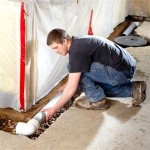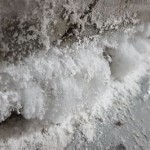How to Get Rid of Spiders in Your Basement
Spiders in basements are a common household nuisance. The dark, damp, and often cluttered environment provides ideal conditions for these arachnids to thrive. While most spiders are harmless and even beneficial because they consume other insects, their presence can be unsettling for many homeowners. Furthermore, a large spider population can indicate the presence of other pest problems within the basement. This article outlines effective strategies for eliminating spiders from your basement and preventing their return.
Identifying the Source of the Infestation
Before implementing any control measures, it's essential to understand why spiders are attracted to your basement in the first place. This involves identifying potential entry points, food sources, and harborage areas.
Entry Points: Spiders can enter basements through cracks in the foundation, gaps around pipes and wires, uncapped drains, and open windows or doors. Even small openings can provide access. Thoroughly inspect the basement perimeter, paying close attention to areas where pipes enter the house or where the foundation meets the ground. Look for cracks in the walls and along the floor, and check the seals around windows and door frames. Any opening, regardless of size, should be considered a potential entry point.
Food Sources: Spiders are predators, so their presence suggests the availability of prey. Common spider prey in basements includes insects like ants, flies, moths, and other small arthropods. If these insects are present in large numbers, spiders will be attracted to the area. Eliminating the food source is a critical step in controlling the spider population. This may involve addressing other pest infestations within the basement.
Harborage Areas: Spiders prefer dark, secluded areas where they can build webs and hide from predators. Clutter in the basement provides ample harborage opportunities. Stacks of boxes, piles of clothes, old furniture, and other items offer spiders a place to build their webs and lay their eggs. Reducing clutter is essential for eliminating spider habitats.
Once the source of the infestation is identified, specific actions can be taken to address each contributing factor. This proactive approach increases the likelihood of successfully eliminating spiders from the basement.
Implementing Preventative Measures
Preventing spider infestations is often more effective than attempting to eliminate an established population. Preventative measures focus on denying spiders access to the basement, eliminating their food sources, and reducing their harborage areas.
Sealing Entry Points: The most effective way to prevent spiders from entering the basement is to seal all potential entry points. This can be accomplished using various materials, including caulk, sealant, steel wool, and weather stripping.
Caulk and Sealant: Use caulk to seal small cracks and crevices in the foundation walls and around windows and door frames. Apply sealant around pipes and wires where they enter the house. Ensure that the caulk or sealant is suitable for the specific material and that it is applied correctly to create a complete seal.
Steel Wool: Stuff steel wool into larger openings, such as gaps around pipes. Steel wool is difficult for spiders to penetrate and provides a physical barrier. The steel wool can then be covered with caulk or sealant to prevent it from rusting and to provide a more aesthetically pleasing appearance.
Weather Stripping: Install weather stripping around doors and windows to create a tight seal that prevents spiders from entering. Ensure that the weather stripping is properly installed and that it is in good condition. Replace worn or damaged weather stripping promptly.
Managing Moisture: Spiders, like many other pests, are attracted to moisture. Address any sources of moisture in the basement, such as leaky pipes, condensation, or poor drainage. Consider using a dehumidifier to reduce the humidity level. Ensure proper ventilation to prevent moisture buildup.
Reducing Clutter: Remove clutter from the basement to eliminate harborage areas. Store items in sealed plastic containers rather than cardboard boxes, which can attract insects and provide shelter for spiders. Regularly clean and organize the basement to prevent the accumulation of clutter.
Controlling Other Pests: As spiders prey on other insects, controlling the populations of these insects will indirectly reduce the spider population. Implement measures to control common basement pests, such as ants, flies, and moths. This may involve using traps, baits, or insecticides. However, use insecticides judiciously and follow all label instructions carefully.
By implementing these preventative measures, homeowners can significantly reduce the likelihood of spider infestations in their basements.
Employing Direct Control Methods
When preventative measures are insufficient to eliminate a spider infestation, direct control methods may be necessary. These methods involve physically removing or killing spiders and their webs.
Vacuuming: Vacuuming is a simple and effective way to remove spiders, webs, and egg sacs from the basement. Use a vacuum with a hose attachment to reach into corners, under furniture, and other hard-to-reach areas. Dispose of the vacuum bag immediately to prevent the spiders from escaping.
Sticky Traps: Sticky traps are a non-toxic way to capture spiders. Place them along walls, in corners, and near potential entry points. Check the traps regularly and replace them when they become full or covered with dust. Sticky traps are most effective for capturing ground-dwelling spiders.
Insecticides: Insecticides should be used with caution and only when other methods have failed. When using insecticides, always follow the label instructions carefully and wear appropriate protective gear. Consider using a targeted spray to treat cracks and crevices where spiders are likely to hide. Avoid spraying insecticides indiscriminately, as this can be harmful to beneficial insects and other wildlife. There are different forms of insecticides available, including:
Residual Sprays: These insecticides leave a residue that can kill spiders for several weeks or months. They are typically applied to cracks, crevices, and other areas where spiders are likely to crawl. However, residual sprays can also be harmful to humans and pets, so they should be used with caution.
Contact Sprays: These insecticides kill spiders on contact. They are typically used to spray spiders directly or to treat webs. Contact sprays are less persistent than residual sprays, so they need to be reapplied more frequently.
Aerosol Sprays: These insecticides are dispensed from a pressurized can. They are convenient for treating small areas, but they can be less effective than other types of insecticides.
Diatomaceous Earth (DE): Diatomaceous earth is a natural insecticide made from fossilized algae. It works by dehydrating insects, including spiders. DE is relatively safe for humans and pets, but it can be irritating to the lungs, so it should be used with caution. Sprinkle DE around the perimeter of the basement, in cracks and crevices, and in other areas where spiders are likely to travel.
Professional Pest Control: In cases of severe infestations, it may be necessary to hire a professional pest control company. Pest control professionals have access to specialized equipment and insecticides that are not available to the general public. They can also identify the source of the infestation and recommend preventative measures to prevent future problems.
When employing direct control methods, it is important to choose the most appropriate method for the specific situation and to use it safely and effectively. A combination of methods may be necessary to eliminate a spider infestation completely.
By understanding the habits and habitat preferences of spiders, and by implementing a combination of preventative and direct control measures, homeowners can effectively eliminate spiders from their basements and create a more comfortable and pest-free environment.

How To Get Rid Of Spiders In Your Basement Youtube

Get Rid Of Basement Spiders Green Giant Home Commercial

How To Get Rid Of Spiders In Your Basement

How To Get Rid Of Spiders In Basement 25 Ways Gws Masonry Services

How To Get Rid Of Spiders In Basement 25 Ways Gws Masonry Services

How To Get Rid Of Spiders In Basement Mbl Construction

How To Get Rid Of Spiders In Your Basement Family Handyman

Get Rid Of Basement Spiders Green Giant Home Commercial

5 Ways To Get Rid Of Wolf Spiders In Basement

Basement Spiders 8 Effective Ways To Get Rid Of Them
Related Posts







